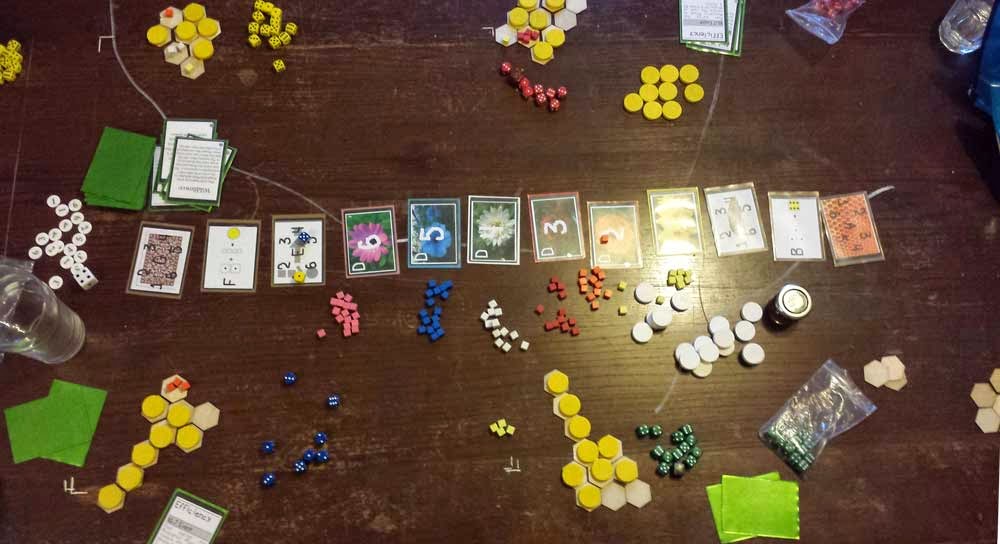Snitch! is currently funding on KickStarter and is a little over 50% toward the target of $16,000
It is being published by
Common Man Games, the company that brought us Police Precinct.
I also recently put up a blog article on a Snitch, my most recent Print and Play project. You can read it
here.
I have now played it a little and completed a solo game, but what is the game about?
The Game

In Snitch! each player takes the role of a detective trying to gather evidence against the city's Kingpin in an effort to aid the District Attorney's attempt to bring her to justice.
But what does this really mean and how does the game play out?
The basic mechanics of the game are 'pick up and deliver' and 'tile placement'. The tile placement represent each detective exploring the city looking for Civilian Informants (or Snitches) who are willing to hand over information. The pick up and deliver mechanic represents the collection of the information from the Snitches which must then be collated and taken to the D.A.
When tiles are placed the City grows. As it grows it will be formed of green areas (safe) and red areas (zones of influence). Safe areas are the areas that each detective can move into/through while undertaking their investigation.
The Zones of Influence (red) are territories that detectives cannot enter, rather they must move around. These are the areas that the Snitches operate in.
As the game progresses each player will start to employ snitches either by paying for them or by spending some of the information they have. Once employed, these snitches will continue to gather information for their detective (though rival detectives can also take actions to interrogate them for the information they hold). Additionally, if not visited regularly, the Snitch will eventually start 'spilling his guts' to anyone who will listen and this is represented by information cubes being placed on the board for anyone to collect.
When enough information is collected by a Detective they can return to the D.A. to hand it over and score points.
Status points are gained for the usefulness of the information provided. This translates to the number multiplied by the variety of information cubes the detective hands over.
Status points are the games currency and are also how a winner is determined.
My Thoughts
I have only played a solo game so far, but it feels like a slick game that should not take too long to play at all. I think my solo effort could have been all wrapped up in about 20 minutes.
For 2-4 players, I would anticipate that it would take about 15 minutes per player.
I really like the theme of the game and how the designers have translated that to the mechanics. The modular tiles building a picture of the city and creating the zones where the snitches operates works well and adds further depth for multiplayer games as these zones can be used to block opponents movements.
The collection of information works well in the theme and the fact that info can also be used as a currency is perfect!
The actual victory conditions are based on your status as a Detective and the fact you can use your status as a bargaining tool works wonderfully (and when you do so your reputation takes a hit, which is the cost to you in status points. This sacrifice can both hinder and help you toward your goal).
There are so many rules in the game that are tied to the theme that it really does give you a sense of playing detective.
The game seeks to make you feel like you are playing Detective, uncovering information and building a case and it really does appear to deliver on that front.
There are number of stretch goals tied to the campaign. I would be particularly keen to see the 5 / 6 player ones reached.
If I had any criticisms, it would be on the colours used. Some of them are very, very hard to distinguish from one another, but this could merely be because I am playing a print and play and they may well change in the final game.
Lastly, for us mere mortals in the UK, the shipping might put a few people off at $25
For more infomration take a look at the Kickstarter:
https://www.kickstarter.com/projects/1529038443/snitch

 The game is played with a set of dice which determine possible available actions to each player. Actions such as increase the hive, collect and hatch eggs (new worker bees), garner favours from the Queen, collect pollen, create honey.
The game is played with a set of dice which determine possible available actions to each player. Actions such as increase the hive, collect and hatch eggs (new worker bees), garner favours from the Queen, collect pollen, create honey.






